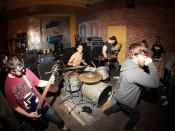The theme of learning is critical in both William Shakespeare's "Hamlet" and Mary Shelley's "Frankenstein." Prince Hamlet must erase all his knowledge of justice, religion, and honor in order to become a revenger. The Creature must first learn to be human, then learn to become an inhumane killer.
Hamlet is, as Ophelia remarks, a perfect nobleman, young, intelligent, and scholarly. He's drawn back to life at Wittenberg. Hamlet rather prudishly denounces the Danes for drinking at parties and not being sufficiently intellectual.
He grieves for his excellent father, but doesn't suspect foul play. Once the Ghost appears, he immediately "learns" the truth. While others notice the Ghost only appears between midnight and cockcrow, and warn Hamlet that he should question the spirit, he believes it. He says he will erase all knowledge but the unsubstantiated information of the Ghost. He will learn to kill.
The secular law, the Catholic and Protestant Churches, and general custom all tell Hamlet he cannot take justice into his own hands.
Laertes, faced with the same problem of Polonius' savage murder, publicly denounces the suspected killer and calls for the people to punish the man. Proven wrong, by a confession and a witness, Laertes cooperates with the King to execute a self-confessed murderer: Hamlet. This shows that Prince Hamlet had other ways to extract justice for his father's murder -- if in fact King Hamlet was murdered, which he can't prove! Hamlet has to teach himself to be a killer. He practices on his mother and Ophelia, speaking brutally and using obscene insults. He kills old Polonius and desecrates the body of his victim. He forges documents to have the innocent fools Rosenkrantz and Guldernstern, his boyhood friends, killed in England.
Eventually, though, he fails. Claudius dies, but so does Hamlet. There is no...


